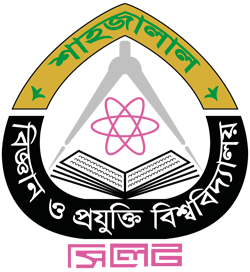- Home
- About Us
- Academics
-
Offices
- Office of the Vice Chancellor
- Office of the Pro Vice Chancellor
- Office of the Treasurer
- Office of the Registrar
- Office of The Dean, School of Agriculture and Mineral sciences
- Office of The Dean, School of Applied Sciences and Technology
- Office of The Dean, School of Life Sciences
- Office of The Dean, School of Management & Business Administration
- Office of the Dean, School of Physical Sciences
- Office of the Dean, School of Social Sciences
- Others
- Research
- Admission
- Campus Life
- Notice Board
- SUCSU
Shahjalal University of Science and Technology
-
Overview
-
Academic
- Program
- Admission
- Session-wise Curriculum
- Student Engagement & Support
-
Research
-
Faculty
-
Student Adviser
-
Former Head
-
Officers
-
Scholarship
-
Activities
-
Announcement
- Notice Board
- News & Events
-
Awards & Honours
- Graduate Student Awards
- Research Awards
- Teaching Awards
- Service Awards
-
Alumni
-
Collaboration
- Academic
- Research
- Student Chapter
-
Contact Us
Overview
As a distinctive discipline, the anthropology
department started its journey in 1995. This discipline began its activities
with three years of honours and a one-year master's degree, and the first
honours degree was awarded in 1998 and the master's degree in 1999.
Fieldwork-based research and integrating distinctive perspectives to studying
society, theory, and research rapidly attracted the student to the department.
The popularity of this discipline in the contemporary world and the usefulness
of the subject matter gave this department an important space. Currently, the
departmental academic and other activities are run by the tireless labour and
dynamic activities of the seventeen teachers. There are five other faculty
members pursuing higher studies at home and abroad. From the start, 30 batches
are running now, and the students of this department are joining different
universities in teaching and are also engaged in the research and development
sector, administration, banking, etc., and are playing a role in the country's
development. In addition, every year, a large number of students of this
department go abroad with a scholarship for higher education and add to the
good reputation of the country by joining different organisations. Every year
nearly 68 students enroll in BSS (Hons), and almost 55 students enrol in MSS in
this department. Along with academic activities, this department organises study
tours, seminars, and workshops. Besides this, it organises different cultural
programmes, including National Day, Women's Day, Children's Day, and Indigenous
People's Day. We welcome prospective students to take part in this journey.
| Full time | Part time | Headcount | FTE | ||
| Faculty Statistics | |||||
| 1.1 | Number of academic staff | 22 | 0 | 22 | 22 |
| 1.2 | Number of academic staff of international/overseas origin | 0 | 0 | ||
| 1.3 | Number of academic staff that are female | 9 | 0 | 9 | 9 |
| 1.4 | Number of faculty staff with PhD | 6 | 0 | 6 | 6 |
| Research Staff Statistics | |||||
| 2 | Number of research staff | 0 | 0 | ||
| Students Statistics | |||||
| 3.1 | Number of total students | 328 | 328 | 328 | |
| 3.2 | Number of students that are female | 178 | 178 | 178 | |
| 3.3 | Number of bachelors/undergraduate students | 280 | 0 | 280 | 280 |
| 3.4 | Number of undergraduate students of international/overseas origin | 0 | 0 | ||
| 3.5 | Number of masters students | 48 | 0 | 48 | 48 |
| 3.6 | Number of masters students of international/overseas origin | 0 | 0 | ||
| 3.7 | Number of doctorate students | 0 | 0 | ||
| 3.8 | Number of doctorate students of international/overseas origin | 0 | 0 | ||
| Student Performance Statistics | ||
| 4.1 | Student Continuation Rate (in %) | |
| 4.2 | Student Retention Rate (in %) | |
| 4.3 | Completion Rate (in %) | |
| 4.4 | First Generation Learners | |
| Degrees Information | ||
| 5.1 | Number of total undergraduate degree programs offered | 1 |
| 5.2 | Number of total undergraduate degree programs offered online | 0 |
| 5.3 | Number of undergraduate degrees awarded | |
| 5.4 | Number of total postgraduate degree programs offered | 3 |
| 5.5 | Number of total postgraduate degree programs offered online | 0 |
| 5.6 | Number of master’s degrees awarded (MSc, MBA, MA, MPhil) | |
| 5.7 | Number of doctorates awarded | |
| Tuition Fees | ||
| 6.1 | Average annual tuition fees for an undergraduate program (BDT) | 9000 |
| 6.2 | Average annual tuition fees for an international undergraduate program (BDT) | 17500 |
| 6.3 | Average annual tuition fees for postgraduate programs – Master’s (BDT) | 6000 |
| 6.4 | Average annual tuition fees for postgraduate programs – PhD (BDT) | 20000 |
| 6.5 | Average annual tuition fees for international postgraduate programs (Master’s & PhD) – SAARC countries (USD) | 500 |
| 6.6 | Average annual tuition fees for international postgraduate programs (Master’s & PhD) – non-SAARC countries (USD) | 1200 |
| Exchange Student Statistics | ||
| 7.1 | Number of undergraduate exchange students – Inbound | |
| 7.2 | Number of undergraduate exchange students – Outbound | |
| 7.3 | Number of graduate/postgraduate exchange students - Inbound | |
| 7.4 | Number of graduate/postgraduate exchange students - Outbound | |
| Institutional Income | ||
| 8.1 | Research income | |
| 8.2 | Research income from industry and commerce | |
| Total (7.1 + 7.2) | ||











